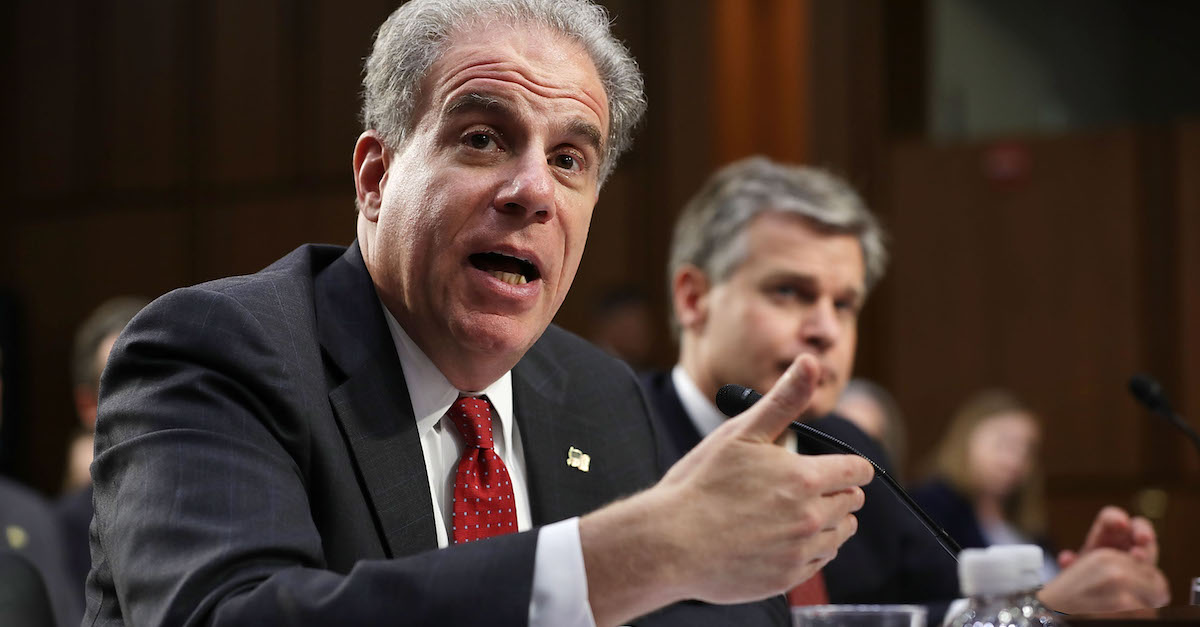
A coalition of inspectors general chaired by Department of Justice Inspector General (IG) Michael Horowitz criticized the DOJ Office of Legal Counsel (OLC) opinion that concluded the Ukraine whistleblower complaint wasn’t an “urgent concern” and didn’t need to be transmitted to Congress.
The Council of the Inspectors General on Integrity and Efficiency (CIGIE) in a Tuesday letter to Assistant Attorney General Steven Engel expressed serious concern that Engel’s opinion — “wrong as a matter of law and policy” — creates “a chilling effect on effective oversight.” Horowitz and dozens of other inspectors general who signed the letter said the Engel opinion should be withdrawn or modified.
The letter came two days before Horowitz told lawmakers that his investigation into possible Foreign Intelligence Surveillance Act (FISA) abuses ahead of the 2016 election is “nearing completion.” Needless to say, many are waiting with bated breath for the release of Horowitz’s findings. The Engel opinion in question “effectively overruled” Trump-appointed Intelligence Community Inspector General (ICIG) Michael Atkinson’s determination about the whistleblower complaint. Atkinson concluded that the complaint was “credible” and “urgent” under the Intelligence Community Whistleblower Protection Act (ICWPA), which meant that he was required by law to forward the complaint to congressional intelligence committees.
Engel came up with a “remarkably thin” rationale to withhold the complaint:
The complaint does not arise in connection with the operation of any U.S. government intelligence activity, and the alleged misconduct does not involve any member of the intelligence community. Rather, the complaint arises out ofa confidential diplomatic communication between the President and a foreign leader that the intelligence-community complainant received secondhand. The question is whether such a complaint falls within the statutory definition of “urgent concern” that the law requires the DNI to forward to the intelligence committees. We conclude that it does not. The alleged misconduct is not an “urgent concern” within the meaning of the statute because it does not concern “the funding, administration, or operation of an intelligence activity” under the authority of the DNI. Id. § 3033(k)(5)(G)(i). That phrase includes matters relating to intelligence activities subject to the DNI’s supervision, but it does not include allegations of wrongdoing arising outside of any intelligence activity or outside the intelligence community itself.
The group of inspectors general said, on the other hand, that the Engel opinion “if not withdrawn or modified, could seriously undermine the critical role whistleblowers play in coming forward to report waste, fraud, abuse, and misconduct across the federal government.” The IGs said that the foreign election interference concern, as raised by the whistleblower, was a claim that indicated a “serious or flagrant problem that relates to an intelligence activity within the DNI’s jurisdiction”:
As an initial matter, we find the arguments and concerns raised by the ICIG [Michael Atkinson] in his September 17, 2019 response to the OLC memorandum compelling. OLC concluded that the foreign election interference alleged by the whistleblower was not an “urgent concern” within the meaning of the ICWPA because it did not concern “the funding, administration, or operation of an intelligence activity” under the authority of the DNI. In his response, by describing and citing to the DNI’s relevant legal authorities, the ICIG showed that the DNI has a broad legal mandate to address intelligence matters related to national security, as well as the specific responsibility to assess instances of possible foreign interference in United States elections and identify, to the maximum extent possible, the methods used and persons and foreign governments involved in the interference. These responsibilities support the ICIG’s conclusion that the protection of federal elections from foreign interference is squarely within the DNI’s “operations.” The legal authorities cited in his letter also support the ICIG’s determination that the whistleblower raised a claim of a serious or flagrant problem that relates to an intelligence activity within the DNI’s jurisdiction. It surely cannot be the case that the DNI has responsibilities related to foreign election interference but is prohibited from reviewing the cause of any such alleged interference.We further note that the DNI has jurisdiction over the handling of classified and other sensitive information. As a result, the whistleblower’s allegation that certain officials may have misused an intelligence system also raises an additional claim of a serious or flagrant problem that relates to the operations of the DNI and therefore may properly be considered an urgent concern under the statute.
The IGs also said that the Engel opinion threatened to undermine the ICIG’s independence and opened a potentially troubling door.
“In our view, the OLC’s opinion undermines the independence of the ICIG and wrongly interprets the respective roles and responsibilities of IGs and agency heads under the ICWPA. Further, the opinion potentially creates space for agency heads across government to make their own determinations related to IG jurisdiction or reporting,” the letter said. “Such a result would be contrary to IG independence and congressional intent in requiring IGs to maintain independent legal counsel and may impede the ability of Congress and taxpayers to obtain the objective and independent oversight they rely on from IGs.”
[Image via Chip Somodevilla/Getty Images]